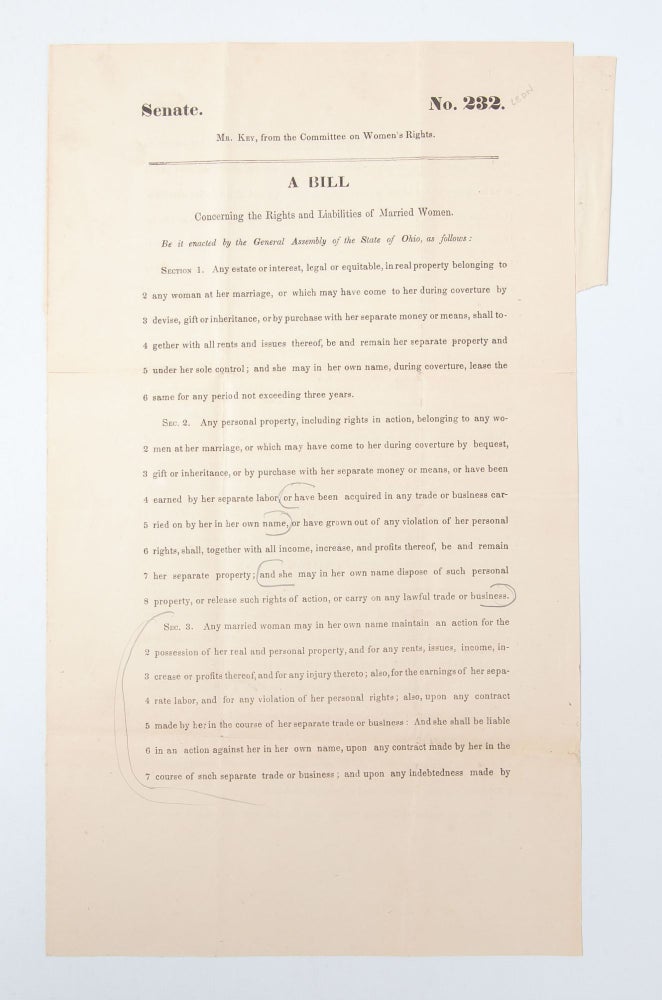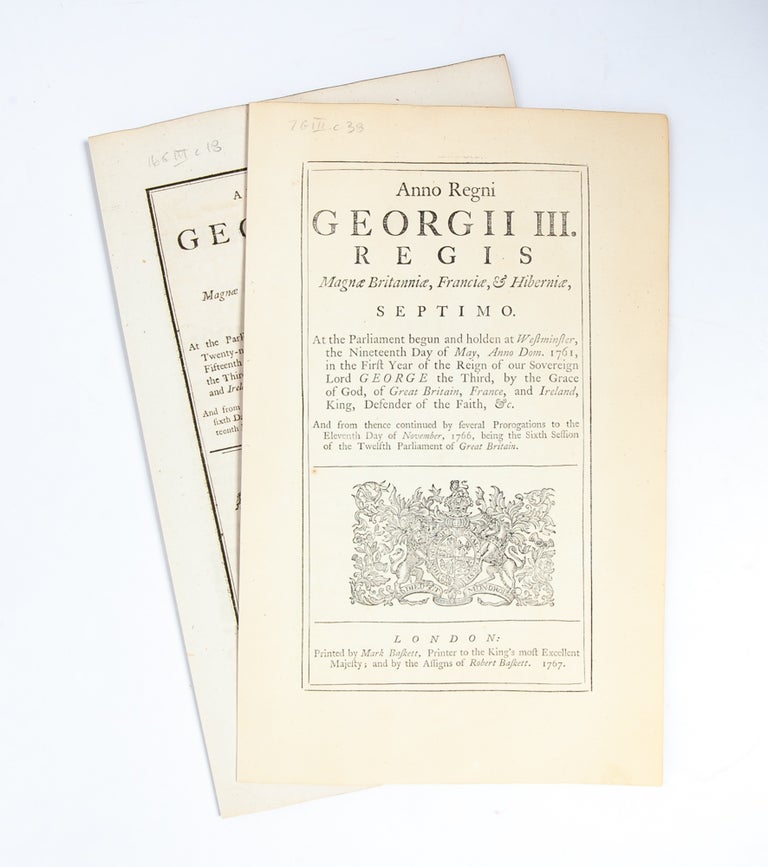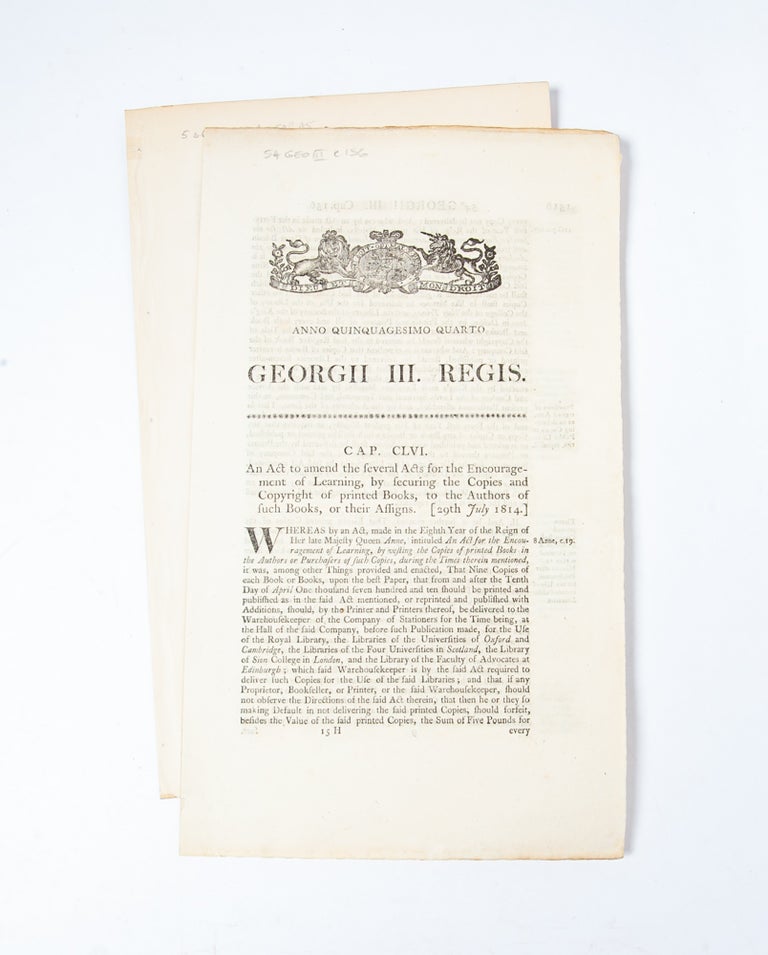Accounts of the Estate of the late Miss Henrietta Campbell, Dec[eased]
Pembrokeshire and London: 1833-1834.
![(Item #5065) Accounts of the Estate of the late Miss Henrietta Campbell, Dec[eased]. Women's Property Rights.](https://whitmorerarebooks.cdn.bibliopolis.com/pictures/5065.jpg?auto=webp&v=1658939470)
![(Item #5065) Accounts of the Estate of the late Miss Henrietta Campbell, Dec[eased]. Women's Property Rights.](https://whitmorerarebooks.cdn.bibliopolis.com/pictures/5065.jpg?auto=webp&v=1658939470)
Accounts of the Estate of the late Miss Henrietta Campbell, Dec[eased]
Pembrokeshire and London: 1833-1834. Folio measuring 190 x 110mm stitched at spine and comprised of 17 manuscript pages of accounts. Compiled by Henrietta Campbell's family friend and executor Dr. Lt. General Alexander Adams, the document shows the scope of Campbell's property, her outstanding expenses related to domestic labor and healthcare, the portion of her estate that was entailed, and the division of remaining money and personal items among her three sisters Lady Campbell, Lady Gage, and Mrs. Hulton. A research rich piece, the accounts give insight into the extent to which even elite, privileged women were beholden to patriarchal property laws that restricted how they might spend or upon whom they might bestow property.
A first cousin of John Campbell, 1st Baron of Cawdor, Henrietta lived in a position of relative comfort. Though she did not own any houses or lands, her accounts show rent on a home at Manorbier Newton in Pembrokeshire near the Cawdor seat as well as lodgings in London. It is unsurprising that the majority of her finances were held at Coutts or in bonds held by Cawdor -- keeping her economically tied to the larger family system. Her own personal property was somewhat limited; while the executor Adams reports throughout the year of locating small sums of money hidden in her lodgings (typically in £1-18 increments), the majority of her holdings existed in the form of domestic and personal items including jewelry, spectacles, silk dresses, china, framed art, and her library of "105 vols. & 19 of Music." Much of this was auctioned off to cover outstanding fees to domestic laborers and local tradespeople, her nurse, the apothecary, the expenses for the funeral, and any remaining taxes and rents; these can provide insight into how physical goods might be traded in-kind (as in the case of dresses supplementing the cash payout to her maid), the calibre of goods Henrietta purchased throughout her life, and the end-of-life expenses of nineteenth century upper classes. The details on her accounts also reveal the extent to which Henrietta's property -- and many noble women's property -- was not her own. Because while £48 was left to be divided among her sisters and chosen heirs (approximately £3500 today), the Baron of Cawdor retained the bulk of her final assets through the family entail approximating £1,280 (approximately £87,000). Ultimately, all assets were consolidated within the family given that the heirs were Henrietta's closest relatives; but Britain's continued system of primogeniture ensured that the most powerful man within the family retained that position and could pass it on to the son who would inherit from him. (Item #5065)

![Accounts of the Estate of the late Miss Henrietta Campbell, Dec[eased]](https://whitmorerarebooks.cdn.bibliopolis.com/pictures/5065_2.jpg?width=768&height=1000&fit=bounds&auto=webp&v=1658939470)
![Accounts of the Estate of the late Miss Henrietta Campbell, Dec[eased]](https://whitmorerarebooks.cdn.bibliopolis.com/pictures/5065_3.jpg?width=768&height=1000&fit=bounds&auto=webp&v=1658939470)
![Accounts of the Estate of the late Miss Henrietta Campbell, Dec[eased]](https://whitmorerarebooks.cdn.bibliopolis.com/pictures/5065_4.jpg?width=768&height=1000&fit=bounds&auto=webp&v=1658939470)
![Accounts of the Estate of the late Miss Henrietta Campbell, Dec[eased]](https://whitmorerarebooks.cdn.bibliopolis.com/pictures/5065_5.jpg?width=768&height=1000&fit=bounds&auto=webp&v=1658939470)
![Accounts of the Estate of the late Miss Henrietta Campbell, Dec[eased]](https://whitmorerarebooks.cdn.bibliopolis.com/pictures/5065_6.jpg?width=768&height=1000&fit=bounds&auto=webp&v=1658939470)
![Accounts of the Estate of the late Miss Henrietta Campbell, Dec[eased]](https://whitmorerarebooks.cdn.bibliopolis.com/pictures/5065_7.jpg?width=768&height=1000&fit=bounds&auto=webp&v=1658939470)


